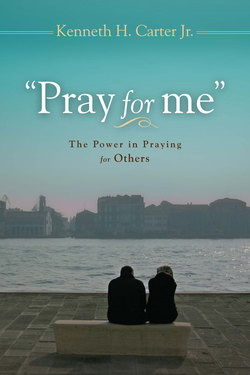Читать книгу "Pray for Me" - Kenneth H. Carter Jr. - Страница 6
На сайте Литреса книга снята с продажи.
ОглавлениеThe Empty Bucket
“Pray for Me”
For twenty-eight years I have been a pastor in local congregations. Besides the recurring pattern of the Christian year, celebrations of Christmas and Easter, weddings, memorial services, visitation of the sick, and confirmation classes, the request for intercessory prayer is a constant.
On the way out of a service, an elderly man will say quietly, “Please pray for my wife”; an e-mail message arrives: “Please pray for my sister who lives in another state.” Or the request may be more direct: “Pray for me. I have a real challenge ahead.”
I have always responded that I would pray. But in reality, and in hindsight, my actual response was at times perfunctory: a fleeting thought or just writing down a name on a page, to give to others later. The motivation to write this book came in part from what seemed my own pastoral failure—I was being asked for spiritual help and attention, but I was not giving the request the engagement it merited.
Even more troubling was the knowledge that many expect the ordained—those set apart—to have the expertise and the time to provide this spiritual support. Intercessory prayer is not exclusive to ordained persons—we share intercession with all of God’s people, and you may be reading this book because you are a gifted intercessor or feel called to pray for others. But it was this concern as a pastor that prompted me to take intercession more seriously.
Here I will share some of what I have learned so that you may be more prepared when someone says to you, “Pray for me.”
The Bucket
The words Pray for me signal a person in need. And when someone is in need—because of illness, a broken relationship, loss of work, a spiritual crisis, or grief, it is as if he or she is carrying a heavy bucket—a bucket filled with emotion, filled with grief, filled with confusion, filled with disappointment.
I learned about the bucket image from a pastor friend. We come from different denominations but share an interest in equipping people to care for one another and to draw nearer to God in retreat settings. This powerful image of the bucket has elucidated intercessory prayer for me.
A person in need or in grief is carrying around this bucket of emotion. An intercessor is one who comes alongside that individual with an empty bucket. The person in need gives his or her agenda to the intercessor, and the intercessor receives that agenda as the work of God, namely prayer. Intercession is carried out by those with enough space in their lives to include the needs of others: family, friends, congregations, communities, and the world.
Emptying Ourselves
Let the same mind be in you that was in Christ Jesus,
who, though he was in the form of God,
did not regard equality with God
as something to be exploited,
but emptied himself,
taking the form of a slave,
being born in human likeness.
And being found in human form,
he humbled himself
and became obedient to the point of death—
even death on a cross.—Philippians 2:5-8
Intercessors follow the example of Jesus, and we need to consider the cost of having the mind that was in Christ Jesus. Intercession requires emptying oneself on behalf of another.
When we worship, we move into the presence of a Holy God. We offer gifts of praise and silence, listening and humility, adoration and repentance. We place these gifts upon the altar. We gaze upon the greatest act of intercession, the cross of Jesus Christ. And we remember that Jesus continues to pray for us. He is the great high priest, seated at the right hand of God.
To make intercession is to worship God. All along the way, we are praising the God who hears our prayers, who is “our help in ages past, our hope for years to come.” We “lay aside every weight and the sin that clings so closely” (Heb. 12:1). We empty ourselves. We look to Jesus, who emptied himself, who endured the cross, who is seated at the right hand of the throne of God (Heb. 12:2).
As you read these pages, as you journey more deeply into a life of intercession, imagine that you are a part of a great procession approaching the throne of grace. You are not alone. You are laying your burdens before the altar. You are preparing for something. Perhaps you are preparing for a more profound ministry of intercession.
I have learned to honor the request “pray for me.” It is a cry for help, however it may be expressed. It is an acknowledgment that we are limited and finite creatures. It is a trust placed in a higher power. It is always prompted by a situation that would not be desired: an illness, a loss, a need, a crisis, a doubt—and yet it is always an occasion for the grace of God, whose power is made perfect in our weakness (2 Cor. 12:9).
That intersection—God’s power and our weakness—lies at the heart of intercession. May the grace of God lead you into a deepened life of prayer for others.
